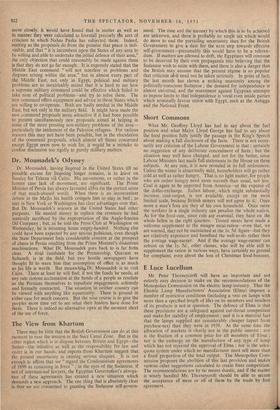A Middle East Command
The four-Power plans for a Middle East defence pact are scrupulously designed not to give offence. That has not prevented the Egyptian Prime Minister from describing them as "worse than colonisation," but, as Nahas Pasha today speaks entirely in clichés, this criticism was to be expected. If the Egyptian Government had been prepared to examine the defence proposals more closely, It would have found that in matter as well as in manner they were calculated to forestall precisely the sort of criticism to which Nahas Pasha has subjected them. Indeed, starting as the proposals do from the premise that peace is indi- visible, and that "it is incumbent upon the States of any area to be willing and able to undertake the initial defence of their area," the only objection that could reasonably be made against them is that they do not go far enough. It is expressly stated that the Middle East command "will not interfere in problems and disputes arising within the area," but in almost every part of the Middle East, not only in Egypt, political and military problems are so inextricably mixed that it is hard to see how a supreme military command could be effective which failed to take note of political problems—and try to solve them. The new command offers equipment and advice to those States which are willing to co-operate. Both are badly needed in the Middle East, but not only in the military field. It might have made the new command proposals more attractive if it had been possible to present simultaneously new proposals aimed at helping in some of the more pressing non-military problems of the area— particularly the settlement of the Palestine refugees. For various reasons this may not have been possible, but in the elucidation of the command proposals, which almost all States concerned except Egypt seem now to wish for, it wojild be a mistake to confine discussion too rigidly to purely military matters.















































































 Previous page
Previous page